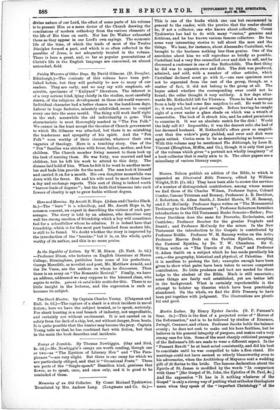Paisley Weavers of Other Days. By David Gilmour. (D. Douglas,
Edinburgh.)—The contents of this volume have been pub- lished before, but they will probably be new to many of our readers. They are early, and we may say with emphasis, ad- mirable, specimens of " Kailyard " literature. The interest is of a very serious kind, lying chiefly in the studies, most carefully drawn, of the religious development in these old-world weavers. Individual character had a better chance in the hand-loom days. Labour in huge factories, minutely subdivided, seems to compel every one into the same mould. The thing will work itself right in the end ; meanwhile the old individuality is gone. This characteristic is most thoroughly marked in "The Pen Folk." We cannot in the least accept the theories of Church government to which Mr. Gilmour was attached, but there is no mistaking the tenderness and sympathy of his spirit. And the "Pen Folk" were worthy of their chronicler, whatever their own vagaries of theology. Here is a touching story. One of the " Pen " families was stricken with fever, father, mother, and four children. The Church member living nearest to them took up the task of nursing them. He was forty, was married and had children, but he left his work to attend to this duty. The disease laid hold of him. When he felt it he went to another mem- ber and bade him provide for the need. The man took it himself and carried it on for a month. His own daughter meanwhile was down with the fever. He and his wife used to meet three times a day and exchange reports. This sort of thing is indeed worth "barrow-loads of dogmas"; but the faith that blossoms into such flowers of charity is apt to grow feeble without dogma.






















































 Previous page
Previous page